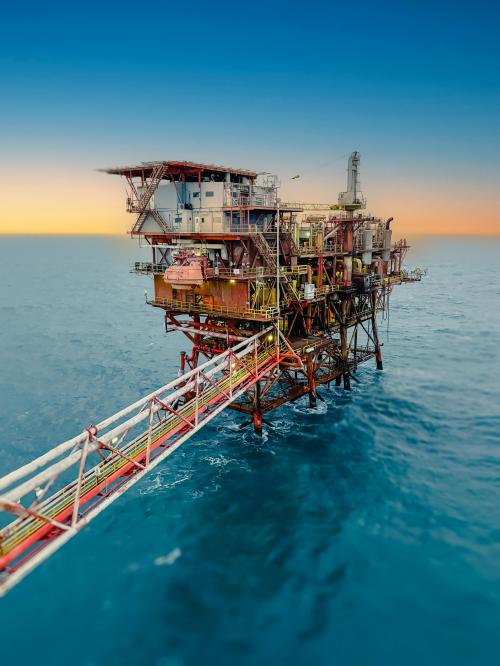What are the Most Common Oil Rig Injuries

The Most Common Oil Rig Injuries and How to Protect Your Rights
Oil rigs are hazardous work environments, with workers facing significant risks every day. The physically demanding nature of the job, combined with the dangerous equipment, high-pressure environments, and fluctuating weather conditions, makes oil rigs one of the most accident-prone industries. If you’ve been injured in an oil rig accident, it’s crucial to understand the risks and know what steps to take to protect your rights and seek compensation for your injuries. In this blog, we’ll explore the most common oil rig injuries and how the oil rig injury lawyers at Ali Law Group can help you through this challenging time.
1. Slips, Trips, and Falls: The Leading Cause of Injury
One of the most common and preventable injuries on oil rigs is slips, trips, and falls. These incidents often occur due to the wet, slippery, and uneven surfaces found on oil rigs. Whether it's spilled oil, water, or inclement weather, the conditions on the rig can create hazardous walking paths. The risks of falls are amplified when workers are navigating the platform’s narrow walkways, uneven grating, or ladders.
Common causes of slips and falls on oil rigs include:
- Spilled oil or chemicals: Oil rigs are filled with machinery that often leaks, creating slippery surfaces.
- Poorly lit areas: Lack of proper lighting makes it difficult to spot potential hazards.
- Uneven or damaged flooring: If the rig's floor is not properly maintained, workers may trip over exposed metal or cracked tiles.
- Inclement weather: High winds or rain can make platforms slippery and dangerous.
Injuries from slips, trips, and falls can range from minor bruises and sprains to more severe fractures, spinal cord injuries, or even fatal accidents. It’s essential to always be vigilant and follow safety protocols to avoid falls. However, if you’re injured in a slip and fall, seeking legal assistance can help you pursue compensation for medical bills, lost wages, and pain and suffering.
2. Burns and Explosions: High-Risk Hazards in Oil Rig Work
The risk of burns and oil rig explosions is ever-present on oil rigs due to the highly flammable nature of the materials handled daily. Oil rigs involve the use of volatile substances such as crude oil, natural gas, and chemicals, which are extremely flammable. Equipment malfunctions, human error, and even environmental factors can lead to explosive incidents, putting workers at risk of severe burns, scarring, or worse.
There are two primary types of burn injuries workers might sustain on oil rigs:
- Thermal burns occur from exposure to extreme heat, such as fire, explosions, or overheated equipment.
- Chemical burns: These are caused by contact with toxic chemicals or substances that are often used on the rig.
The consequences of burns can be devastating, causing long-term physical and psychological scars. Severe burns may require multiple surgeries, long hospital stays, and months or even years of rehabilitation. If you or a loved one has suffered burn injuries from an oil rig explosion or fire, it is crucial to have an experienced attorney at your side to help you pursue compensation for your medical care and related losses.
3. Crush Injuries: A Major Threat on Oil Rigs
Crush injuries are another common and serious hazard on oil rigs. These injuries occur when a worker’s body is caught between heavy machinery, equipment, or large objects, leading to severe damage to tissues, bones, and internal organs. With heavy machinery such as drills, cranes, and compressors constantly in operation, the risk of being pinned or crushed by malfunctioning equipment is high.
Common causes of crush injuries on oil rigs include:
- Heavy equipment malfunctions: When machinery is not properly maintained or operated incorrectly, workers are at risk of being crushed.
- Falling objects: Large items or tools may fall from heights on oil rigs, landing on workers below.
- Improper training: Workers who aren’t adequately trained may not understand the full scope of hazards when operating or being near heavy machinery.
Crush injuries can result in broken bones, internal bleeding, amputations, or organ failure. In some extreme cases, crush injuries can lead to fatal accidents. Oil rig operators need to follow strict safety measures, ensure proper training, and conduct regular maintenance checks on equipment. If you’ve suffered a crush injury, you have the right to seek compensation from your employer or the responsible party.
4. Limb and Joint Injuries: Repetitive Strain and Trauma
Limb and joint injuries are common on oil rigs due to the physically demanding nature of the work. Oil rig workers are required to lift heavy equipment, use power tools, and work in awkward positions for extended periods. Over time, this repetitive motion can lead to joint injuries, muscle strains, and tendon damage.
Common limb and joint injuries on oil rigs include:
- Rotator cuff tear: Repetitive overhead motions can damage the shoulder tendons.
- Knee and back injury: Lifting heavy items and working in uncomfortable positions can strain the knees and lower back.
- Carpal tunnel syndrome: Repetitive motion from using power tools can lead to nerve compression in the wrist.
Limb and joint injuries can be debilitating, often requiring surgery, physical therapy, and long-term recovery. Oil rig workers who experience joint pain or muscle strain should seek medical attention immediately. A prompt diagnosis can prevent further damage and support the injured worker in pursuing compensation for their rehabilitation.
5. Falls from Heights: A Fatal Risk on Oil Rigs
One of the most dangerous risks on oil rigs is falling from heights. Oil rigs are typically elevated structures, and workers often perform tasks at high altitudes, such as working on the rig’s platform or maintaining equipment. A fall from such heights can result in severe injuries or death, particularly when workers are not wearing appropriate fall protection equipment.
Falls from heights can occur due to:
- Defective safety equipment: If fall protection gear such as harnesses, lanyards, or guardrails is faulty or not properly secured, workers are at risk of falling.
- Improper training: Lack of proper fall protection training can lead to workers making mistakes or failing to use safety equipment.
- Poor rig maintenance: If walkways, platforms, or ladders are poorly maintained, workers are at a higher risk of losing their footing and falling.
Falls from heights can cause traumatic injuries, including skull fractures, spinal cord injuries, broken bones, and internal bleeding. Workers who have been involved in falls should seek immediate medical attention to prevent further complications and address any potential life-threatening injuries. Legal action can also help recover damages for the long-term impact of a fall-related injury.
Protect Your Rights After an Oil Rig Injury
Oil rig accidents are incredibly dangerous, and the injuries they cause can have lifelong consequences. If you or someone you love has been injured in an oil rig accident, it's essential to take immediate action. Not only will seeking medical treatment help ensure your recovery, but consulting a personal injury attorney is critical to protect your rights and pursue compensation related to your injuries.
At Ali Law Group, our experienced oil rig injury attorneys specialize in helping oil rig workers navigate the complex legal system after an accident. We understand the unique challenges that oil rig injuries present, and we are committed to helping you recover damages for medical expenses, lost wages, and pain and suffering.
We offer free consultations and can help you understand your legal options after an oil rig accident. Don’t wait until it’s too late—contact Ali Law Group today to discuss your case and get the legal support you deserve.
Contact Ali Law Group for Professional Legal Assistance
If you’ve been injured on an oil rig, don’t wait to take action. Contact Ali Law Group for a free consultation today. Our personal injury lawyers can help you pursue the compensation you may be entitled to based on your injuries.
Disclaimer: The information provided on this blog is for informational purposes only and does not constitute legal advice. Every situation is unique, and the law can be complex. For specific legal guidance on your personal injury case in Texas, contacting an experienced attorney is essential. The Ali Law Group is not responsible for any actions taken based on the information contained here.















